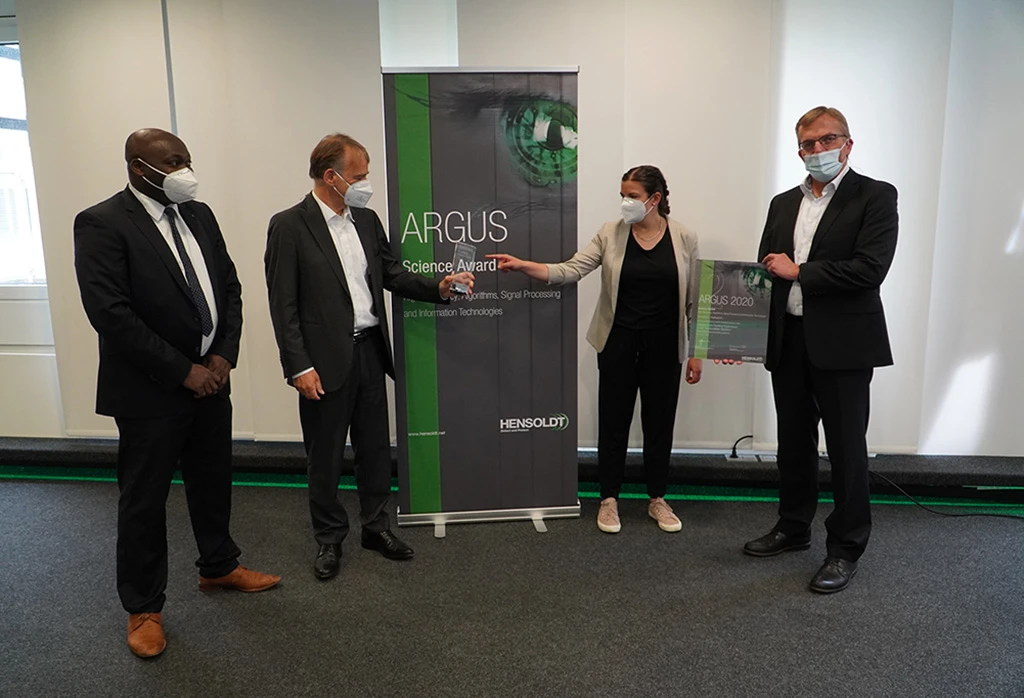HENSOLDT awards "Argus" prize to students

Outstanding graduates in information and electrical engineering honoured
Ulm/Germany, 20 May 2021 – The sensor manufacturer HENSOLDT has awarded its "Argus" research prize to outstanding theses by university graduates in high-frequency and communications engineering, digital signal processing, optronics and cybertechnology as part of its cooperation with research institutions and universities. New findings in these specialist areas are important for the further development of the technology group's product portfolio.
"Our products represent the state of the art," said HENSOLDT Chief Human Resources Officer Peter Fieser at the welcoming ceremony. "Their development and production requires experts who enjoy challenging tasks and want to contribute their skills to complex projects."
The prize, each worth 1,500 euros, has been awarded for 18 years. The award ceremony took place during the annual Professor's Day, due to the pandemic as an online event with over 500 participants. Professors from technically oriented universities and colleges as well as experts from the company regularly use this platform to exchange knowledge. "All the award-winning papers deal with the field of sensor technologies - a key technology for the security and defence capability of the Federal Republic of Germany. As such, they make contributions to the technological sovereignty of Germany and Europe," emphasised Dr Jürgen Bestle, Chief Technology Officer of HENSOLDT.
A jury of university professors and company experts selected outstanding bachelor's and master's theses by graduates of the Ulm University of Technology, one from the Fraunhofer Institute for Communication, Information Processing and Ergonomics (FKIE), two from the Friedrich-Alexander University Erlangen-Nuremberg, two from the Karlsruhe Institute of Technology (KIT) and one from the Rhenish-Westphalian Technical University Aachen from numerous submissions.
First prize in the "Bachelor" category went to David Brunner from the Karlsruhe Institute of Technology (KIT) with his work on mutual interference influence in automotive radars, supervised by Professor Thomas Zwick. Another prize was awarded to Veronika Keilwerth from the Ulm University of Technology with her Bachelor's thesis, supervised by Professor Thorsten Hasbargen, on the reliability of testing apps in aerospace or medical technology. Steffen Jung from the Fraunhofer Institute FKIE and the University of Bonn also received an award for his work. Supervised by Professors Peter Martini and Wolfgang Koch, he dealt with the use of artificial intelligence to increase the safety of autonomous vehicles.
In the "Master" category, Patrick Fenske from Friedrich-Alexander-Universität Erlangen-Nürnberg (Professor Martin Vossiek) was awarded with a thesis on the identification of transmitters for tracking deliveries of goods in the context of Industry 4.0. Also supervised by Professor Martin Vossiek at Friedrich-Alexander-Universität Erlangen-Nürnberg was André Scheder, who was awarded for his Master's thesis on efficiency-enhancing communication technologies. Jonas Pfaff from the Karlsruhe Institute of Technology dealt with multi-antenna systems of the next generation of mobile communications and received a prize for his work, which was supervised by Professor Thomas Zwick and Professor Cagri Ulusoy. The jury also found the Master's thesis by Thindlu Rudrappa Manjunath from the Fraunhofer Institute FHR and the Rhenish-Westphalian Technical University Aachen worthy of a prize. Supervised by Professors Dirk Heberling and Peter Knott, he investigated the non-contact measurement of circulation parameters using a new type of radar technology.
In his laudatory speech, HENSOLDT technology coordinator Dr Guy Kouemou, who moderated the event, emphasised the special role of close cooperation between industry and research: "New innovative products based on networked sensor technology, digitalisation and artificial intelligence, for example, require a great deal of detailed research. The outstanding graduates of our partner colleges, universities and research institutes make an important contribution to this".
At HENSOLDT's Ulm site, around 2,500 employees are involved in the development and production of complex safety electronics, including radars, electronic protection systems and high-frequency electronic components. Most of the employees are engineers and technicians, and about 120 young people are in training.
About HENSOLDT
HENSOLDT is a major German player in the defence industry with a leading market position in Europe and a global reach. Headquartered in Taufkirchen near Munich, Germany, the company develops sensor solutions for defence and security applications. As a technology leader, HENSOLDT also continuously expands its Cyber portfolio and develops new products to combat a wide range of threats based on innovative approaches to data management, robotics and cybersecurity. With more than 5,600 employees, HENSOLDT generated revenues of 1.2 billion euros in 2020. HENSOLDT is listed on the Frankfurt Stock Exchange and the SDAX stock market index there.
Press contact
Lothar Belz
Tel.: +49 (0)731.392.3681
lothar.belz@hensoldt.net
